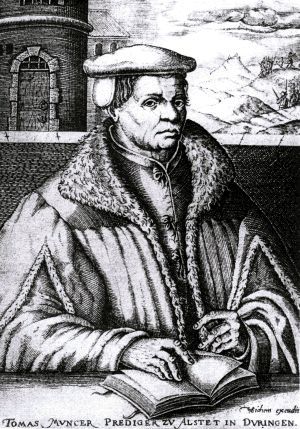


Books in series

Filippiche. Testo a fronte
341

Selected Political Speeches
1984

Велики оратори
Мартин Лутер, Томас Мюнцер
1984
Authors

Martin Luther (1483-1546) was a German monk, theologian, university professor and church reformer whose ideas inspired the Protestant Reformation and changed the course of Western civilization. Luther's theology challenged the authority of the papacy by holding that the Bible is the only infallible source of religious authority and that all baptized Christians under Jesus are a spiritual priesthood. According to Luther, salvation was a free gift of God, received only by true repentance and faith in Jesus as the Messiah, a faith given by God and unmediated by the church. Luther's confrontation with Charles V at the Diet of Worms over freedom of conscience in 1521 and his refusal to submit to the authority of the Emperor resulted in his being declared an outlaw of the state as he had been excommunicated from the Roman Catholic Church. Because of the perceived unity of the medieval Church with the secular rulers of western Europe, the widespread acceptance of Luther's doctrines and popular vindication of his thinking on individual liberties were both phenomenal and unprecedented. His translation of the Bible into the vernacular, making it more accessible to ordinary people, had a tremendous political impact on the church and on German culture. It furthered the development of a standard version of the German language, added several principles to the art of translation, and influenced the translation of the English King James Bible. His hymns inspired the development of congregational singing within Christianity. His marriage to Katharina von Bora set a model for the practice of clerical marriage within Protestantism. Much scholarly debate has concentrated on Luther's writings about the Jews. His statements that Jews' homes should be destroyed, their synagogues burned, money confiscated and liberty curtailed were revived and used in propaganda by the Nazis in 1933–45. As a result of this and his revolutionary theological views, his legacy remains controversial.

Marcus Tullius Cicero was a Roman philosopher, statesman, lawyer, political theorist, and Roman constitutionalist. Cicero is widely considered one of Rome's greatest orators and prose stylists. Alternate profiles: Cicéron Note: All editions should have Marcus Tullius Cicero as primary author. Editions with another name on the cover should have that name added as secondary author.


Thomas Müntzer (ca. 1489 – 27 May 1525) was a German preacher and theologian of the early Reformation whose opposition to both Luther and the established Catholic church led to his open defiancé of late-feudal authority in central Germany. Müntzer was foremost amongst those reformers who took issue with Luther’s compromises with feudal authority. He became a leader of the German peasant and plebeian uprising of 1525, was captured after the battle of Frankenhausen, and was tortured and executed. Few other figures of the German Reformation have raised so much controversy, which continues to this day, as Müntzer. A complex and unique figure in history, he is now regarded as a highly significant player in the early years of the German Reformation and also in the history of European revolutionaries. Almost all modern studies of Müntzer stress the necessity of understanding his revolutionary actions as a consequence of his theology: Müntzer believed that the end of the world was imminent and that it was the task of the true believers to aid God in ushering in a new era of history. Within the history of the Reformation, his contribution – especially in liturgy and Biblical exegesis – was of substance, but remains undervalued.